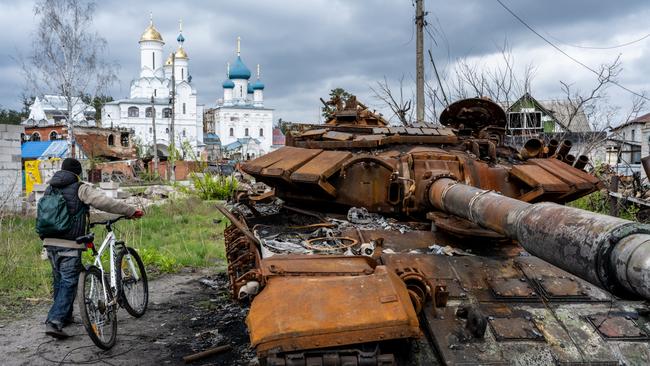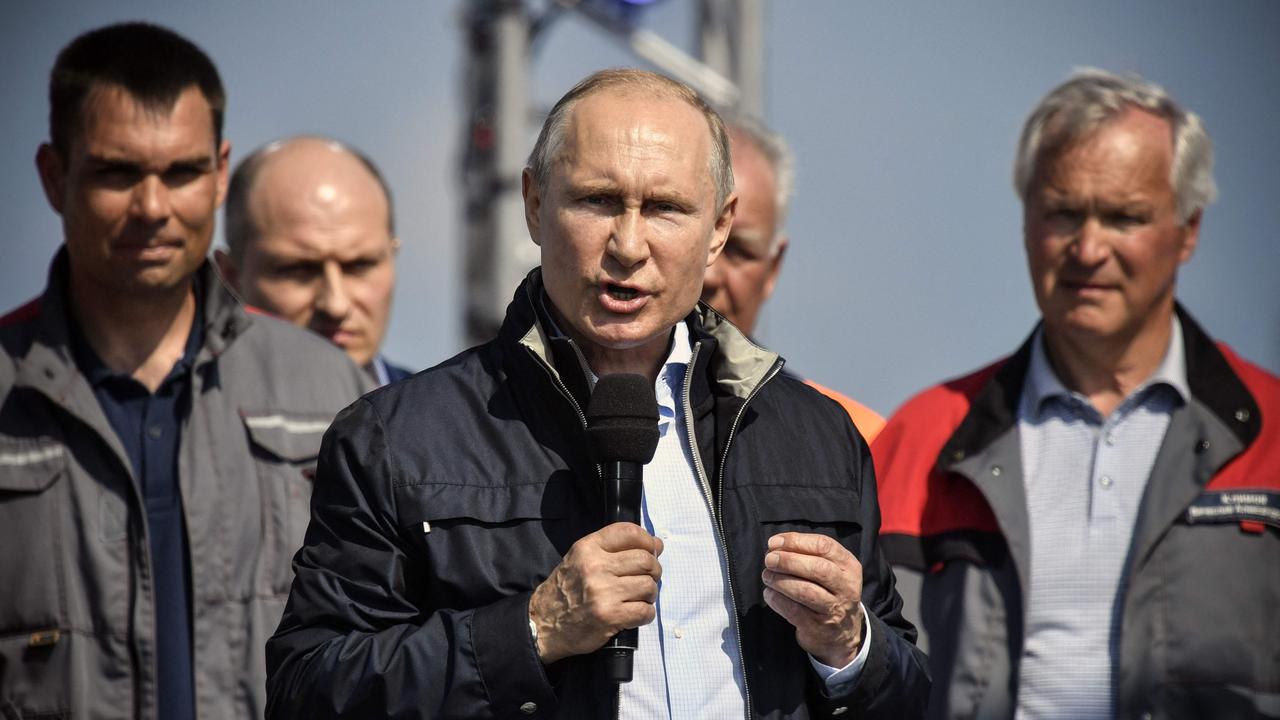Why the war in Ukraine may not deter China
Many hope the West’s strong response in Ukraine will give Beijing second thoughts about Taiwan. But Xi might think differently.

China’s military and civilian leaders have watched with dismay as Moscow’s anticipated blitzkrieg in Ukraine turned into a drawn-out slog marked by a series of Russian defeats. China last fought a war in 1979 – a campaign against Vietnam that ended in a humbling draw – and used to admire Russia for its ability to translate violence into political gains. No more.
“Russia’s military image and credibility have crumbled,” says Zhou Bo, a recently retired senior colonel in the People’s Liberation Army who serves as a senior fellow at Tsinghua University in Beijing. “This has become a war they did not expect.”
US strategists wonder what effect these setbacks will have on Beijing’s aspirations to absorb Taiwan, an island democracy that China considers part of its territory. Will China be deterred by Russia’s failures and the surprisingly strong Western reaction to the invasion? Or will it draw different lessons, learning from Russia’s tactical mistakes while hoping to benefit from the eventual exhaustion of Western military resources?
The answer is of vital importance to the West. Unlike the bloodshed in Ukraine, a military confrontation over Taiwan, should it erupt, is likely to involve the West directly. If deterrence fails, this would be America’s first war in generations against a near-peer adversary, likely resulting in staggering losses. Taiwan also plays a much more central role in the global economy, with a gross domestic product almost four times that of Ukraine and a near-monopoly on indispensable advanced semiconductors.
As China’s navy and air force intensify drills around Taiwan, Chinese officials hold their cards close to the chest. They insist the events in Ukraine will have no bearing on their decisions about Taiwan. They bristle at what they call Western attempts to “Ukrainise” the Taiwan issue.
“Of course the war in Ukraine should stop as soon as possible, but whatever happens there should not hinder our reunification efforts,” says Cui Tiankai, a former Chinese ambassador to Washington and deputy foreign minister who remains influential in Beijing. “For us in China, national reunification is the goal, whatever international environment we might have.”
US officials say Chinese leader Xi Jinping has set a 2027 deadline for making the PLA ready to invade Taiwan. Despite the PLA’s modernisation and sophisticated new equipment, nobody knows how it would perform on the battlefield, given that none of its soldiers has combat experience.
“The lesson for China is that the war in Ukraine has massively increased strategic ambiguity about what could happen if they were so foolish as to launch a military takeover of Taiwan,” says former British prime minister Boris Johnson, who was a key Western advocate of military assistance to Kyiv. “I don’t think anybody really expected the US or the UK and many, many other countries to support Ukraine in quite the decisive, practical way that we did.”
Though Taiwan is Beijing’s key objective, the Chinese Communist Party’s overriding priority remains the survival of its rule, according to Valerie Niquet, head of the Asia department at the Foundation for Strategic Research, a Paris think tank that advises the French government, among others. “The road to that survival doesn’t pass through a collapse of the Chinese economy, an eventual military defeat and a humiliation should they fail to take possession of Taiwan,” she says.
Western officials say the experience of Ukraine has punctured the narrative, embraced by Moscow and Beijing alike, of impotent, decadent Western democracies in inexorable decline. The Europeans, in particular, have turned out to be surprisingly willing to impose serious economic sanctions, severing dependence on Russian energy to back Ukrainian.
Yet it’s too early to think the fundamental takeaway for Beijing is that it shouldn’t invade Taiwan, officials caution. The war in Ukraine is far from over and a Russian defeat isn’t a foregone conclusion. Despite a slew of Western sanctions, the Russian economy hasn’t collapsed and President Vladimir Putin’s regime hasn’t faced serious internal challenges even as Russian combat losses have soared. When it comes to Western unity, China and Russia still likely believe sooner or later the united front on Ukraine will collapse, perhaps after next year’s US presidential election.
“The situation is difficult for Russia, but Russia still has more manpower, military strength and overall national strength to support this war,” Zhou says.
“President Putin cannot afford to lose this war because how can he explain why all these people have died? He needs to justify this. On the other side, how can the Western support be sustained if the war becomes protracted?”
In many ways, the future of Western unity over Ukraine has become intertwined with the challenge of defending Taiwan. The prevailing view among the allies is that an inability to prevent Russian success in Ukraine would embolden Beijing. “If China sees that we are not willing to stick together to help Ukraine, where Russia is so clearly and obviously recognised as the aggressor, then I think China will not be really impressed with anything we say about Taiwan,” says retired lieutenant general Ben Hodges, a former commander of the US Army in Europe.
Others, particularly in the Republican Party, say the flow of weapons to Ukraine should be curtailed because it has significantly weakened US military muscle in Asia. Though the military needs of Ukraine and Taiwan are different, given the huge role that ships and planes would play in any war over the island, there is still substantial overlap, particularly in scarce air defences. A war in Taiwan would also require large amounts of artillery ammunition, which is being quickly consumed in Ukraine.
“The argument that China is going to be deterred fundamentally by what happens in Ukraine is highly exaggerated,” says Elbridge Colby, a Republican strategist who served in a senior Pentagon role in the Trump administration.
“China’s decision on whether to attack is primarily going to be determined by China’s assessment of the regional military balance.
“And the war in Ukraine depletes weapons stocks that cannot be easily replenished.”
Such arguments, according to Matt Pottinger, who served as deputy national security adviser in the Trump White House, overlook the growing co-operation between Russia and China, whose leaders announced a “no limits” partnership shortly before the invasion.
“It’s pretty clear that Taiwan would be a second front in the same war as the one that’s under way in Ukraine,” he says. “We should not kid ourselves that by leaving Europe on its own we will somehow strengthen deterrence in the Western Pacific.”
Under the Taiwan Relations Act of 1979, the US supplies weapons to Taiwan, the only nation to do so on a significant scale. Taiwan is purchasing hundreds of Harpoon anti-ship missiles to counter a potential Chinese amphibious assault and is considering other major military upgrades.
Authorities are still deciding, however, whether to shift to a so-called porcupine strategy, which would use widely dispersed weapons such as anti-ship, antitank and anti-aircraft missiles to repel a land invasion.
Though President Joe Biden has said repeatedly that Washington would intervene should China invade Taiwan, there is no binding commitment to do so, in contrast to an attack on a NATO ally.
According to a war game carried out by the Centre for Strategic and International Studies this year, the US would lose thousands of troops, between 200 and 484 aircraft, and between eight and 17 ships, likely including aircraft carriers, in the first weeks of the conflict, depending on different scenarios.
China’s economy and military would be devastated, much of Taiwan would lie in ruins and Japan, which would almost certainly be dragged into the war, could suffer serious damage. In most of these exercises China ultimately suffers defeat, though not when Taiwan is left to fend for itself.
“If war breaks out, everyone who participates is a loser … because they will see massive attrition on both sides,” says retired US Air Force lieutenant general David Deptula, dean of the Mitchell Institute for Aerospace Studies and a participant in the war game. “My biggest takeaway is that we have to get creative about deterring China from invading Taiwan in the first place, which involves inducing sufficient uncertainty about success and/or consequences in Xi’s mind.”
Given the historic similarities in Chinese and Russian military equipment and doctrine, down to rank insignia, it’s no surprise that Chinese commanders are carefully analysing the war in Ukraine.
One likely strategic conclusion, some senior Western officials say, is that Russia doomed itself by invading with too small a force, expecting a surrender rather than a determined fight.
China’s military lesson, they warn, is that Beijing would need to go after Taiwan with a massive shock-and-awe strike, mounting a far larger force and possibly leveraging its nuclear threat.
On a more tactical level, according to Zhou, the lesson drawn by the PLA from Russia’s misfortunes in Ukraine is to have better and more secure communications, more precision-guided missiles and more drones – items China already possesses in quantities well exceeding Russia’s prewar stocks. Chinese military officials say Beijing has recently carried out deep military reforms.
“If the Russians screwed up, it doesn’t mean that the Chinese leadership believes that it will also screw up,” says Alexander Gabuev, director of the Carnegie Russia Eurasia Centre in Berlin and one of the leading Russian experts on China. “They may think that Putin is an idiot, that the Russians have hollowed out their army by graft and that the Russians lack motivation, whereas China is fine when it comes to motivation and may think: ‘We have built up the army instead of pilfering it away, and everything will work out for us.’ ”
For Xi, who has already snuffed out the autonomy of Hong Kong, achieving control over Taiwan would be the biggest prize of his campaign for China’s “national rejuvenation”, washing away the dishonour suffered at the hands of foreign imperialism. Colonised by Japan in the 19th century, Taiwan has developed its distinct identity in part because since then it has been ruled only briefly by the mainland, in 1945-49.
Mirroring Russia’s rhetoric dismissing Ukraine’s elected government as an illegitimate “Kyiv junta” and presenting itself as a liberator, China insists most Taiwanese are really on its side.
“If we use military force to resolve the Taiwan issue, we would target the extreme minority of Taiwanese independence elements and foreign forces that interfere, and not the people of Taiwan,” PLA Lt Gen He Lei says.
Like other Chinese officials, He scoffs at any comparisons between Ukraine and Taiwan, pointing out that no major nation grants diplomatic recognition to Taiwan’s authorities.
“It’s like comparing the beauty of a person with the beauty of a pig. Ukraine is a sovereign country, while Taiwan is an unalienable part of China’s sacred territory,” he says. “Conflicts between two countries must be resolved through peaceful negotiations.”
To many Taiwanese, the parallels with Ukraine are crystal clear. While fears of a Chinese invasion have been present since the Communist Party seized China’s mainland in 1949, last year’s Russian invasion drove home that the unthinkable can actually happen, sometimes with frightening speed.
“I hope that Xi has learned the good lesson from Ukraine: if you invade and try to bully a neighbouring country, you are going to fail and the whole world will stand together more than you can imagine,” says Wang Ting-Yu, a senior member of the Taiwanese parliament’s defence committee.
“But if Xi Jinping has learned the lesson that he wouldn’t make the strategic and tactical mistakes like Putin, that Putin is stupid but Xi Jinping is smart, the lesson of how to win a war instead of how to not have a war – then the Ukrainian lesson may become a tragedy for China.”
Yaroslav Trofimov is The Wall Street Journal’s chief foreign affairs correspondent.



To join the conversation, please log in. Don't have an account? Register
Join the conversation, you are commenting as Logout